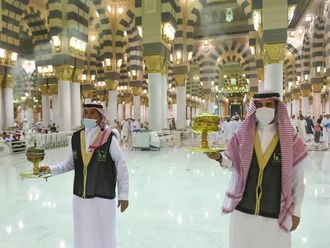Beirut: A day after two Saudi soldiers were gunned down by alleged Al Qaida terrorists on Tuesday, King Abdullah Bin Abdul Aziz Al Saud summoned his Minister of Interior, Prince Ahmad Bin Abdul Aziz, and abruptly dismissed him.
The 87-year-old monarch was livid at the recent wave of attacks that rocked the kingdom and, according to a well-placed source, rejected Prince Ahmad’s preferences to play for time.
The king was unhappy that the July 2012 demonstrations in the Eastern Province city of Qatif resulted in clashes between police units and Shiite protesters demanding the release of imprisoned cleric Shaikh Nimr Al Nimr that resulted in two deaths.
As these protests occurred a few weeks after Prince Ahmad succeeded his brother, the palace extended its full support to the former long-time Deputy Minister of Interior who, presumably, was fully briefed on domestic affairs.
Still, the king was not pleased to learn that security forces detained dozens of people, with serious socio-political consequences at a time when events in nearby Bahrain threatened to spillover inside the kingdom.
The monarch probably decided to act after the August 26 clashes, when two Saudis and six Yemenis were apprehended in Riyadh and Jeddah allegedly preparing explosives for upcoming attacks, and which led to a slew of arrests.
Even if investigators concluded that at least one member of the cell had had his fingers amputated from injuries sustained by working on explosives, ominously discovered inside a Riyadh mosque, Riyadh concluded that key decisions could no longer be postponed.
King Abdullah has now turned to his nephew, Prince Mohammad Bin Nayef — perhaps the country’s top security leader whose low-key but highly efficient programmes crippled the putative Al Qaida potential in the country — to accelerate the introduction of sorely needed reforms.
Prince Mohammad was born on August 30, 1959 in Jeddah to Princess Al Jawharah Bint Abdul Aziz Bin Musaid Al Jiluwi — one of the most important tribal allies of the Al Saud — and the late Prince Nayif Bin Abdul Aziz (1934-2012).
A US-educated official with a Bachelor of Arts degree in Political Science, the affable prince assumed his security duties in 1999, and received credit for his carrot-and-stick approach to dealing with various challenges.
In fact, the counter-terrorism programmes he devised for the country earned him universal accolades. Not only was he effective in mounting an unprecedented campaign against militants in the aftermath of the May 12, 2003 bombings that killed 35 and wounded over 200 on the Vinnell Compound in the capital, Prince Mohammad managed to secure the arrest of Abdul Rahman Al Gamdi, then a leading Al Qaida member.
Equally impressive was his counter-insurgency programme that revolved around a comprehensive rehabilitation effort to eliminate some of the causes that led young Saudi men astray.
His strategy focused on how to best to rout Al Qaida from the kingdom as he encouraged former militants to discuss their views with Wahhabi clerics and Western-trained psychiatrists.
Although not a full-proof programme, since several “graduates” from the centres re-emerged in Yemen fighting with Al Qaida, Prince Mohammad earned his king’s backing along with unprecedented popular support.
Regrettably, his efforts displeased enemies who plotted to assassinate him on August 27, 2009, when a suicide bomber, Abdullah Hassan Al Assiri, blew himself up as Prince Mohammad entered his majlis.
Al Assiri had spoken to Prince Mohammad a few days prior to the assassination bid, ostensibly to surrender. The prince was confident that no security risks existed as the terrorist was flown in private jets and whisked inside the palace. It was later determined that Al Assiri had hidden the explosive device inside his rectum.
King Abdullah rushed to the hospital where Prince Mohammad received medical attention, which underscored his value for Riyadh, not only as a senior member of the ruling family but also as an irreplaceable counter-terrorism expert.
Speculation that this latest appointment introduced a dramatic new change in the country’s succession mechanism filled the airwaves and the blogosphere.
What was undeniable, however, was the fact that the 53-year-old Mohammad Bin Nayef became the first member of the second generation of the Al Saud to be entrusted with a senior portfolio.











